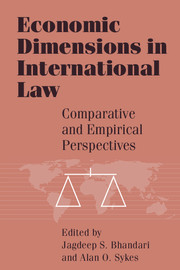Book contents
- Frontmatter
- Contents
- Preface
- Introduction: Economics and international law
- 1 The economics of the most favored nation clause
- 2 The economics of “injury” in antidumping and countervailing duty cases
- 3 The economics of “injury” in antidumping and countervailing duty cases: A reply to Professor Sykes
- 4 Innovations in support of the unitary injury test in U.S. unfair trade cases
- 5 The free trade–fair trade debate: Trade, labor, and the environment
- 6 International conflict and coordination in environmental policies
- 7 Market modernization of law: Economic development through decentralized law
- 8 Toward a positive theory of privatization: Lessons from Soviet-type economies
- 9 New stories on exchange rate policies in transition
- 10 Is deposit insurance inevitable? – lessons from Argentina
- 11 The market for migrants
- 12 The interplay of liquidation and reorganization in the bankruptcy systems of Canada and the United States: The role of screens, gatekeepers, and guillotines
- 13 International political economy approaches to international institutions
- 14 The trade effects of domestic antitrust enforcement
- 15 The Hartford Insurance Company case: Antitrust in the global economy – welfare effects and sovereignty
- 16 Recognition of foreign judgments as a trade law issue: The economics of private international law
- 17 Externalities and extraterritoriality: The law and economics of prescriptive jurisdiction
- Index
7 - Market modernization of law: Economic development through decentralized law
Published online by Cambridge University Press: 05 December 2011
- Frontmatter
- Contents
- Preface
- Introduction: Economics and international law
- 1 The economics of the most favored nation clause
- 2 The economics of “injury” in antidumping and countervailing duty cases
- 3 The economics of “injury” in antidumping and countervailing duty cases: A reply to Professor Sykes
- 4 Innovations in support of the unitary injury test in U.S. unfair trade cases
- 5 The free trade–fair trade debate: Trade, labor, and the environment
- 6 International conflict and coordination in environmental policies
- 7 Market modernization of law: Economic development through decentralized law
- 8 Toward a positive theory of privatization: Lessons from Soviet-type economies
- 9 New stories on exchange rate policies in transition
- 10 Is deposit insurance inevitable? – lessons from Argentina
- 11 The market for migrants
- 12 The interplay of liquidation and reorganization in the bankruptcy systems of Canada and the United States: The role of screens, gatekeepers, and guillotines
- 13 International political economy approaches to international institutions
- 14 The trade effects of domestic antitrust enforcement
- 15 The Hartford Insurance Company case: Antitrust in the global economy – welfare effects and sovereignty
- 16 Recognition of foreign judgments as a trade law issue: The economics of private international law
- 17 Externalities and extraterritoriality: The law and economics of prescriptive jurisdiction
- Index
Summary
Glendower: “I can call spirits from the vasty deep.”
Hotspur: “But will they come when you do call for them?”
– Shakespeare, Henry IVMany people believe that modernizing the law in developing countries requires comprehensive reform directed by politicians and state officials. For example, labor law must restructure employment relations to protect jobs, land reform must reorganize agriculture by redistributing rural property, antitrust law must suppress monopolies that obstruct development, and safety regulation must protect consumers and workers against defective products. Priorities vary, but reformers agree that political leaders and state officials must take the initiative to replace outdated laws with comprehensive statutes.
This article concerns an alternative approach to modernizing the law. Economic competition changes products and techniques, which in turn creates new problems of coordination and cooperation. Communities of people solve these problems by developing norms of behavior. Social norms impose obligations and coordinate expectations. The state raises some social norms to the level of law. To illustrate, consider safety on the steps of a family's house. Custom determines a standard of safety in maintaining steps. If someone is injured on the steps and sues the homeowner, the court in a common-law country will use the customary standard to determine whether the homeowner was negligent in maintaining the steps. Similarly, the American Bar Association imposes a code of ethical responsibility on lawyers and courts hold lawyers liable for some harms resulting from their unethical conduct.
- Type
- Chapter
- Information
- Economic Dimensions in International LawComparative and Empirical Perspectives, pp. 275 - 323Publisher: Cambridge University PressPrint publication year: 1998
- 1
- Cited by



